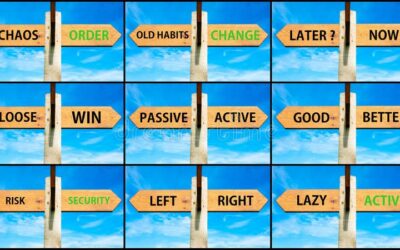Your marks are pretty decent. But you want to push them to the next level. How?
First realize that the difference between a good and great student is not in hours spent studying.
Rather, it is about the little things: habits.
I will be sharing ten small but impactful habits that will allow you to get the most value from your precious time, and improve the quality, not the quantity, of your studying.
These are based on my personal experience as a high-achiever, as well as years of evidence-based research:
- Be a presence in class
- Greet the teacher
- Understand, then memorize
- Small, consistent efforts
- Ride the wave
- Review backwards
- Read ahead
- Assasinate distractions
- Stay organized (the easy way)
- Get enough sleep
This article is quite long. A lot of people won’t finish it. But if you’re serious about doing better at school, you need to read this, and more importantly, take action.
People do not decide their futures, they decide their habits and their habits decide their futures – F.M Alexander
Be a presence in class
If you want to do really well, you need to be involved in class. No exceptions.
That means sitting in front, asking and answering lots of questions, and listening carefully, to the teacher and your peers.
If you don’t believe me, consider this: In my English class, there are five top students. We all sit in the front row.
But, I get it. Sitting in the back of the class with your friends is fun. And that’s fine. So long as you realize that your marks are going to reflect your priorities.
By participating in class you:
- Reduce time spent studying: by absorbing more information, prioritizing content the teacher emphasises, and identifying and filling in the gaps in your own knowledge
- Gain a better understanding of the content by asking and answering questions (more on this in the next section)
- Become known by your teacher and peers as intelligent
- (most importantly) Teachers often drop hints for tests, or mention important details that aren’t in your notes. Listening carefully in class is how you become the only guy that answers that one question ‘you were never taught’.
Greet the teacher when you leave
The more relationships you form with teachers, the better high school is going to be for you.
Building relationships allows you to get leadership roles, get help from people who want to help you, and opens up a lot of opportunities you never would have considered (trust me).
So, thank the teacher when you leave the class. Be sincere. Have a smile on your face. Turn it into a meaningful interaction.
A good relationship starts with respect and politeness.
Understand, then memorize
Earlier I mentioned that by participating in class, you get a better understanding of the work.
But why is this important?
Because by building understanding, you make it easier for yourself to learn things.
To take a very basic example: It’s extremely difficult to mindlessly memorize the first one hundred prime numbers. But when you understand what makes a number prime (the fact that it only has two factors, 1 and itself), then it becomes easy to identify the first one hundred prime numbers.
The same principle applies to everything else, whether you’re learning the adaptations of mitochindria to cellular respiration, or the causes of the French revolution. Understanding makes memorization easier.
There is one very powerful way to increase your understanding. Ask why, repeatedly. Why does Francium lose electrons easily? Because of a low ionization energy. Why does Francium have a low ionization energy? Because of the shielding effect. Why does the… And so on.
By aiming for understanding, you build a solid foundation of the basics, and make learning and memorizing new concepts far easier.
Small, consistent efforts
If you want to do better at school, this is your golden ticket, for three reasons:
Small efforts compound. If you take 5 minutes to practice a concept you learned in maths today, then tomorrow, when you build on that concept, you’ll find you have an advantage.
Maybe because you took the time to practice, you finish before everyone else, and do two extra sums in class. Your advantage has increased (compounded).
Now you go home and practice. But now, because you’ve gotten better at the section, you finish three sums in 5 minutes, instead of two.
Carry on doing this, and your advantage gets bigger and bigger, like a snowball effect. Because the more maths you do, the faster you do it, and the faster you do it, the more maths you can do.
So do two extra sums a day. By the end of the year, you won’t just have done 600 more sums than everyone else. Because you’ve been working faster than everyone else, the number is likely to be in the thousands.
The same principle applies to every subject, but especially maths and physics.
Practice how you play. If you fool around at sports practices, then, come game time, you’re going to look like a clown.
The same applies to school.
If you’re getting everything wrong in class tests and homework assignments, this will translate to actual, important tests, and your marks will suffer.
It’s just how learning works. If you cram the day before a test, chances are the day after you’ve forgotten everything. Now you have to study all that work again come exam-time. I promise you that by the end of the year you’ll have spent more time studying than those who opted for long-term retention, through short, consistent study sessions.
I would quickly like to kill-off a myth that people like to believe. They think that they can slack in grade 8, 9 and 10, and then start putting in effort in grade 11 and 12, and still do well. Guess what? It doesn’t work. People in my grade said the same thing, and nothings changed.
Because if you haven’t mastered the basics in the earlier grades, when you build on those basics later on, you’re going to be behind everyone else from day one. You’re going to be playing catch-up the whole year, which isn’t fun.
In conclusion: Consistency is more important than hard work. By a long shot.
In fact, it’s so important that the next three sections are all about consistency.
Ride the wave
Related to the previous point:
If you fall behind, you’re going to struggle to catch up.
It’s far better to stay on top of things.
So finish projects early, start studying for tests a week beforehand, and do homework as soon as you get it.
Review backwards
When you’re reviewing your work, its always good to do it facing backwards, because this increases the amount of radioactively induced oxytocins…
I’m just kidding.
But seriously. Review work done in class. Everyday.
Grade 11 physics is… difficult. I won’t lie, I was struggling early in the term.
Until I started reviewing the work we did everyday. Quickly I caught up, mastered the basics of each section, and leapt forward.
Read ahead
When I’m reviewing the work we did in class that day, I also like to read ahead.
Because I know I don’t want to be sitting in class tomorrow, panicking because I don’t know what’s going on, and as a result missing something important.
Reading ahead helps you ride the wave.
But it also helps you contextualise what you learn, and understand how the section fits together. And, as we discussed earlier, understanding = better learning.
Assassinate distractions
How can I remember more in my study sessions, do better work, and save time?
Identify and eliminate distractions. Mercilessly. Like a bloody ninja.
Put your phone on do not disturb. Put it in another room. Chuck it out the window. Whatever is necessary.
Close the door while you’re studying.
Stop listening to distracting music.
Clean up your desk.
Stop studying in your room.
There’s really so much you can, and should, do.
Because every single time you get distracted, you lose about 25 minutes all told. Yes, you did read that right. Let me repeat it for you. Every single time you get distracted, it takes you about 25 minutes to properly reset and regain your focus.
Get organized (the easy way)
Four things:
- Use your diary to write down homework. When you pack your bag, check your diary so you don’t forget anything. Simple.
- Get a to-do list, like Todoist. Write down important things. Instead of worrying and hoping that you’ll remember something, rest assured knowing it will get done.
- Weekly reviews (add this to your to-do list). Every Sunday, ask yourself: What could I have done better? How can I improve on this? What am I grateful for this week? What things do I need to accomplish next week?
- Use a calendar. You can buy a physical one and hang it up in your room. During your weekly review, plan work sessions for that week.
Get enough sleep
If consistency is the most important thing on this list, getting enough sleep is just a step above that.
Seriously guys.
If you haven’t realized, 8 hours is actually the bare minimum amount of sleep you should be getting.
I know what your reaction is: ‘My schedule is packed. I get home at 7. Then I have to eat and do homework’. I get that. It’s not easy to get enough sleep. I also rarely get 8 hours of sleep anymore.
But at least recognizing that it is a huge problem, which you should actively be working to solve, is an important first step.
In the short-term, lack of sleep leads to a loss of motivation, a huge drop in performance (especially in sports), distraction and irritability.
But long-term sleep deprivation is altogether more dangerous. It is strongly linked to weight gain, depression and anxiety and a permanent decrease in brain function, among other long-term health issues.
If you want to get better at anything, whether it be swimming, academics or rugby, getting more sleep is actually one of the easiest and most effective ways to do so.
And it is difficult. I won’t pretend otherwise. But often it just means decreasing the time you spend on your phone.
So I challenge you: tonight, get an extra half-hour of sleep, and see how difficult it really is.
I can write this article, and you can read it, and we can all feel jolly good about ourselves. But in reality, no one’s accomplished anything. Why?
Because you need to take action.
If you’re serious about doing better at school, I challenge you to be more consistent. Start by studying a minute or two each day. Do an extra maths sum. Write these habits down on a piece of paper, and stick it up next to your bed. Do something!
If you need help turning these habits into reality, I highly recommend this step-by-step guide on the topic.


